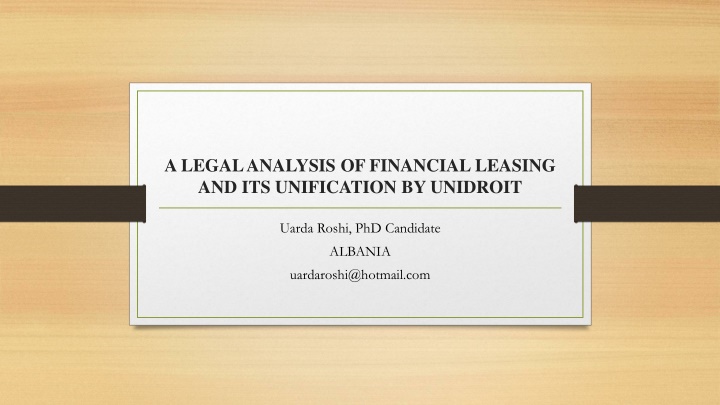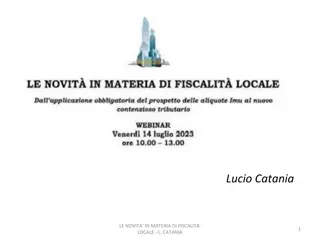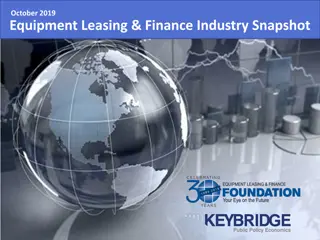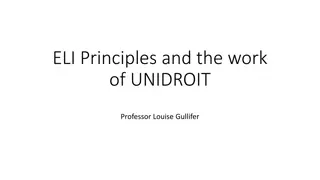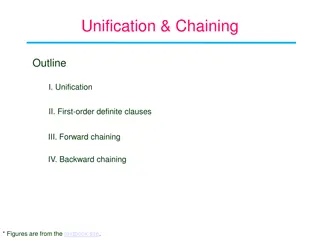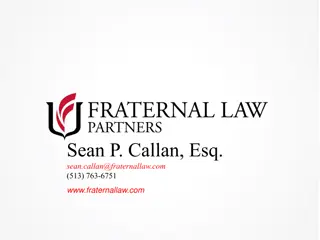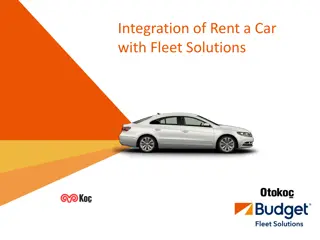A Legal Analysis of Financial Leasing and Unification by UNIDROIT
Financial leasing has experienced rapid development globally, necessitating unification efforts by UNIDROIT. This analysis delves into the complexities of international financial leasing, addressing the need for uniform rules and the role of UNIDROIT in fostering cross-border leasing operations.
Download Presentation

Please find below an Image/Link to download the presentation.
The content on the website is provided AS IS for your information and personal use only. It may not be sold, licensed, or shared on other websites without obtaining consent from the author.If you encounter any issues during the download, it is possible that the publisher has removed the file from their server.
You are allowed to download the files provided on this website for personal or commercial use, subject to the condition that they are used lawfully. All files are the property of their respective owners.
The content on the website is provided AS IS for your information and personal use only. It may not be sold, licensed, or shared on other websites without obtaining consent from the author.
E N D
Presentation Transcript
A LEGAL ANALYSIS OF FINANCIAL LEASING AND ITS UNIFICATION BY UNIDROIT Uarda Roshi, PhD Candidate ALBANIA uardaroshi@hotmail.com
ABSTRACT Financial Leasing is a novel concept to many countries, compared to earlier forms of commerce in juridical circulation. In spite of this, it is one of the activities that has recently experienced rapid development in many countries all over the world including those in development and in transition ones. In the past decades, the increased economic cooperation between states and the development of international financial operations have helped raise the use of cross-border leasing. International Leasing has shown to be a valuable mean of financing for companies that want to export capital goods (machinery, plant, equipment, etc) or for those who want to develop new production units abroad. However, one should not forget that the complexity of the agreement is enhanced by the operation of two or more markets. Besides the difficulties typically linked with international financing activities (risk management) the fact that for leasing each national system has its own legal framework associated with a different tax treatment creates a tangle of provisions often difficult to unravel. This paper aims to provide a theoretical analysis of international financial leasing. The paper is organized into three main parts: The first part points out the needs for unification highlighting the initiatives of UNIDROIT in this context. Then the second part focuses on analysing the definition, legal nature and some aspects of leasing which are unique in the international environment. The last part mainly discusses the sphere of application both substantive and geographic of the uniform rules and the general provisions Key world: UNIDROIT Convention; International Financial Leasing; Scope of application, uniform rules.
THE NEED FOR UNIFICATION AND UNIDROIT WORK ON LEASING The world market of financial leasing from the beginning was strongly segmented with leasing companies operated inside their own national borders. This fragmentation in terms of economy find an exact match on the legal field In general most legal systems have simply tried to force leasing into what seem the most appropriate of the existing contractual figures while neglecting the nature and economic reality of leasing. Only some of civil law countries have prepared law that regulate such contract while in other jurisdictions that have not yet taken steps in this direction judges have had to resort to the legal codes obtaining different solutions, as regards for the common law countries, their different tradition led to solutions that are revealed very distant from continental ones Differences in the legal treatment of financial leasing in different jurisdiction resulted in a low diffusion in the international operations.
THE NEED FOR UNIFICATION AND UNIDROIT WORK ON LEASING Recognizing the need for certainty in international trade, the UNIDROIT secretariat proposed to Governing Council the realization of a preliminary study on the opportunity and the possibility to elaborate uniform rules on international financial leasing operation. The main motivation behind UNIDROIT s effort for unification on field of leasing was based primarily in two inter related factor, one economic the other legal Even though the convention is still not so popular , the unification of the law in this field has set a prerequisite for wider usage of leasing beyond national borders. The UNIDROIT Convention on International Leasing is structured into three main parts preceded by a preamble : The first part includes articles which delimit the convention sphere of application both substantive and geographic, and also include general provisions. (chapter1, Article 1-6) The second part represents the main body of the convention and contains substantive provisions dealing with right and obligation of the parties (chapter 2, Article 7-14), And the third part include final provision (chapter 3, Article 15-25).
DEFINITION AND GENERAL FEATURES OF INTERNATIONAL FINANCIAL LEASING The UNIDROIT Convention on International Leasing provides a definition of financial leasing that well describes the legal term of this economic operation. Financial leasing transaction includes three parties -- the lessor, the lessee and the supplier, and two contracts - the supply contract and the leasing contract. The Convention appropriately distinguishes the financial leasing operation from the financial leasing contract highlighting the interdependence between the supply contract underneath the lease and the relationships that are created between the three parties involved in the operation. Chronologically and functionally, the tri-partite relationship passes several stages: The first step in the operation is taken by the prospective lessee whom selects the supplier and the equipment according to its requirements ; Once the equipment has been selected and the supplier chosen the lessee enters into a lease contract with the lessor requiring the acquisition of the equipment from the supplier and granting the use of it in the return for certain (periodic) payments. The rentals payable under the leasing agreement are calculated so as to take into account in particular the amortisation of the whole or a substantial part of the cost of the equipment. the lessor thereafter enters into a supply contract with the supplier, acquiring the asset selected by the lessee, meanwhile the supplier must be aware that the equipment is being acquired in order to lease to the lessee the supplier delivers the equipment to the lessee.
DEFINITION AND GENERAL FEATURES OF INTERNATIONAL FINANCIAL LEASING At the expiry of the period fixed in the leasing contract, the lessee has three option : - He is entitled to seek renewal of the leasing contract for a further period, usually by continuing the contract with reduced rentals calculated on the basis of the equipment residual value at the end of the fixed period. - - he may return the equipment to the lessor in a good working state or he may exercise the option to purchase the equipment leased with a symbolic price. Typically in countries belonging to civil law family the final purchase option constitutes an essential element of the financial leasing contract but is not so in other countries especially in those belonging to common law systems For this reason the Convention is applicable regardless by the fact that the user has, or not the option of buying the good The trilateral complex structure of the economic operation does not resolve in the presence of two independent contracts subsisting relationship between the parties which are not regulated directly by them. Although there is no contract between the lessee and the supplier, between them will be establish a relationship which, despite not being contractual constitutes the logical basis of the atypical distribution of rights and obligations. For this reason the lessee in certain cases may be entitled to claim directly the supplier on the basis of the general rule that duties of the supplier under the supply contract shall also be owed to the lessee as if it were a party to that contract and as if the equipment were to be supplied directly to the lessee.
LEGAL NATURE OF INTERNATIONAL FINANCIAL LEASING While seeking out the legal nature of financial leasing contract we should bear in mind some important factors: The purpose of the operation namely to procure for lessee use of relatively new equipment instead of the expense of the full purchase price. Leasing contracts are financial operation both in spirit and purpose; The means resorted to in achieving this purpose, namely the credit facilities; The purely financial nature of the role played by the lessor whose sole interest is to have its own investment in the purchase price plus amortisation plus profit margin covered by the aggregate rental payments; The dynamic role played in the transaction by the lease who select the equipment and the supplier on its own; UNIDROIT Convention classifies international financial leasing as a form of independent, innovative, sui generis contract. While it s true that financial leasing agreement contain similar elements of different pre- existing agreement regulated by the private law it emerge quite clearly that is not identical to any of those agreements including - neither loan, nor authorisation, nor hire, nor purchase agreements.
THE INTERNATIONALITY OF FINANCIAL LEASING UNDER UNIDROIT CONVENTION The essence of an international leasing operation lies in the fact that the parties involved are resident or have their place of business in different countries. Considering the trilateral character of leasing transaction which involves the supplier, the lessee and the lessor can be identified four possible international leasing operations (cross border leasing) - state and the lessee operates in another state. Export leasing - In an export lease the supplier and the lessor have their places of business in the same In this case the lease is used as export financial support by the supplier. - equipment supplier is located in a different country. The lessor imports the asset and leases it to the lessee. Import leasing - In an import lease, the lessor and the lessee are domiciled in the same country but the - which operate in the same state International financing when the leasing company belongs to a different state than the supplier and lessee - systems International leasing in the strict sense when the three parties operate in three different national legal
THE INTERNATIONALITY OF FINANCIAL LEASING UNDER UNIDROIT CONVENTION However, according to UNIDROIT Convention art.3 the essential relationship to bear in mind in calculating the internationality of leasing transactions it s the individual leasing contract concluded between the lessee and the lessor, and therefore is required that only the lessee and the lessor have their place of business in different countries, being irrelevant the location of the supplier. This means the third essential party to the international financial lease, may have its place of business in the same Contracting State as the lessor or the lessee, or in a third-party State. To this end is excluded the Import leasing transactions in which the supplier is seen as the only party belongs to another country. The international nature of the relationship is not in fact sufficient to make the convection applicable. The Convention is applicable when not only the lessor and the lessee have their places of business in different contracting countries but also when that the supplier has its place of business in a Contracting country.
THE SPHERE OF APPLICATION OF THE UNIDROIT CONVENTION ON INTERNATIONAL FINANCIAL LEASING The substantive sphere of application is identified by article 1 which provides a definition of financial leasing that well describes the legal term of this economic operation by highlighting also the original, complex, hybrid nature of the agreement. By the combined interpretation of paragraphs 1 and 2 of Article 1 are deduced the various types of leases that are excluded from the scope of the Convention. The sale and lease back contract. The tripartite nature of the operation excludes this contract from the scope of the Convention. In this case the parties are two as the supplier and the lessee are the same person. Also this contract is often used in real estate filed that is excluded from the scope of the Convention. In fact, Article 1 establishes in paragraph 1 that the object of leasing consists in plant material or other capital goods. This article has been posed with the intent to limit the scope only to movable property. Some doubt has arisen in connection with the term plant. The principal source of difficulty raise when the plant that was leased as a chattel but subsequently became annexed to a land. Article 4 govern cases in which the good is incorporated or connected to immovable property by resorting to a rule of conflict, according to which the conflicts concerning relations between the lessor and the owner of real estate are subject to the lex rei sitae .
THE SPHERE OF APPLICATION OF THE UNIDROIT CONVENTION ON INTERNATIONAL FINANCIAL LEASING The consumer leasing is explicitly excluded from the scope of the convention because the international financial leasing transaction, as well as described in Article 1, paragraph 4 covers only capital goods the destination of which must not be for personal, family or household use. According to UNIDROIT convention the equipment must be of a type that can be used by the lessee for business or professional purpose only. The exclusion of the consumer leases of movables from the scope of the convention is justified by the quite different criteria applicable to consumer and non-consumer transactions, according to which consumer contracts are subject to a specific and different rules which take into account the position of the consumer as a weaker party. Moreover, this exclusion intends to ensure that domestic consumer-protection laws are not affected by the UNIDROIT convention s provisions. Should be considered also the fact that consumer leasing is a particular case that has rare occurrence on the international filed. The operating leasing The exclusion of this type of contract is due to its complete assimilation to the rent in fact the lessor does not play a purely financial role as in financial leasing and therefore does not arise the same issues relating to the distribution of risks and responsibilities. Also according to article 1(2)(c) in the financial leasing agreement there is a link between the rentals payable under the leasing agreement and the period of economic amortisation of the leased asset, a link which would not normally exist under an operating lease.
THE SPHERE OF APPLICATION OF THE UNIDROIT CONVENTION ON INTERNATIONAL FINANCIAL LEASING Falls within the scope of the Convention the sub-lease agreement, which is a contract used by a lessee, to lease a portion or the entire object to a third party for the remainder or even a portion of the remaining lease term. Article 2 provides that in the case of one or more sub-leasing transactions involving the same equipment, for the scope of this Convention the supplier is the person from whom the first lessor bought the equipment and the supply contract is the one with which the equipment was originally acquired. Essentially independently of the number of sub-leasing contracts that have taken place there will be one supplier and one of supply contract, the original one. The Convention say nothing more about the form and the content that should characterize the contract and the type of connection. Article. 5 of UNIDROIT convention on international financial leasing establishes the dispositive character of the uniform rules in terms of leasing by recognizing the autonomy of the parties a central role. This article provides the opportunity for the contracting parties to choose the applicable law and to define the exact terms of their contract. The principle of party autonomy established in UNIDROIT Convention on international financial leasing Art. 5 is of paramount importance and represents a guarantee in the context of international trade. The basic objective of this principle is not the exclusion of the Uniform Law but to ensure the freedom of the contracting parties to choose the law applicable to their contractual relationship. In this connection, what is important to be discussed is the extent of the contracting parties freedom of choice. Unlike the provisions of the Vienna Convention, Party autonomy is a limit in three Convectional provisions which witch have imperative nature: Articles 8(3) lessor's warranty of quiet possession in case of intentional or grossly negligent acts of the lessor, Article 13(3)b lessor's damages in the event of default by lessee,Article 13(4) acceleration of rentals due.
THE SPHERE OF APPLICATION OF THE UNIDROIT CONVENTION ON INTERNATIONAL FINANCIAL LEASING Given the fact that the financial leasing operation includes three parties -- the lessor, the lessee and the supplier, and two contracts -- the supply contract and the leasing contract it was necessary to determine how the three parties contribute in determining the exclusion or derogation of the uniform rules. For the exclusion, the Convention, similar to the line followed for the field of application, has provided to involve all the three parties participating in the operation, so the exclusion of the Convention must be result of both the supply contract and the lease contract. In contrary the derogation from individual provisions are agreed by the parties in their mutual relations and is thus possible that one of the parties remains aliens to the exclusion of any conventional rules. Another important principle in UNIDROIT convention is the good faith principle which is to be used for interpreting provisions of the Convention as a uniform international law text as stated in paragraph 1 of Article 6 According to that provision, the UNIDROIT convention on International Financial Leasing is to be interpreted and applied in a way that "the observance of good faith in international trade" is promoted. This provision clearly requires arbiters and judicial officers to treat the Convention as a creature autonomous from domestic laws, namely in interpreting the Convention, decision-makers must not be quick to "read in" domestic concepts.
CONCLUSION Nowadays, international financial leasing has emerged as an important means of financing in international market. Being a type of contract still new that has not yet reached a stable comprehensive regulation in many countries, from the legal point of view the problem of harmonization, so as to lessen the degree of legal uncertainty, is felt more in this field than others. In this regard The UNIDROIT Convention on International Financial Leasing represents an important legal development for parties considering cross-border leasing transactions and has set a prerequisite for wider usage of leasing beyond national borders while also serving as a model for future national legislation. UNIDROIT Convention recognized international financial leasing as "distinctive triangular relationship highlighting her independent, innovative, sui generis nature. The sphere of application of the UNIDROIT convention is defined by Articles 1 6 according to which the convention governs the contract of international financial leasing (application ratione materiae) between the parties the lessee and the lessor whose places of business are in different States (application ratione personae) when the states of the three parties (lessee, lessor and supply) are Contracting States (direct application) or when the rules of private international law lead to the application of the law of a Contracting state (indirect application). The inclusion of principles such as party autonomy, the obligation of good faith in the provisions of the UNIDROIT Convention reflects the strong conviction of the international community that specific warranties are the cornerstones of an open, market-oriented and competitive international economic .
